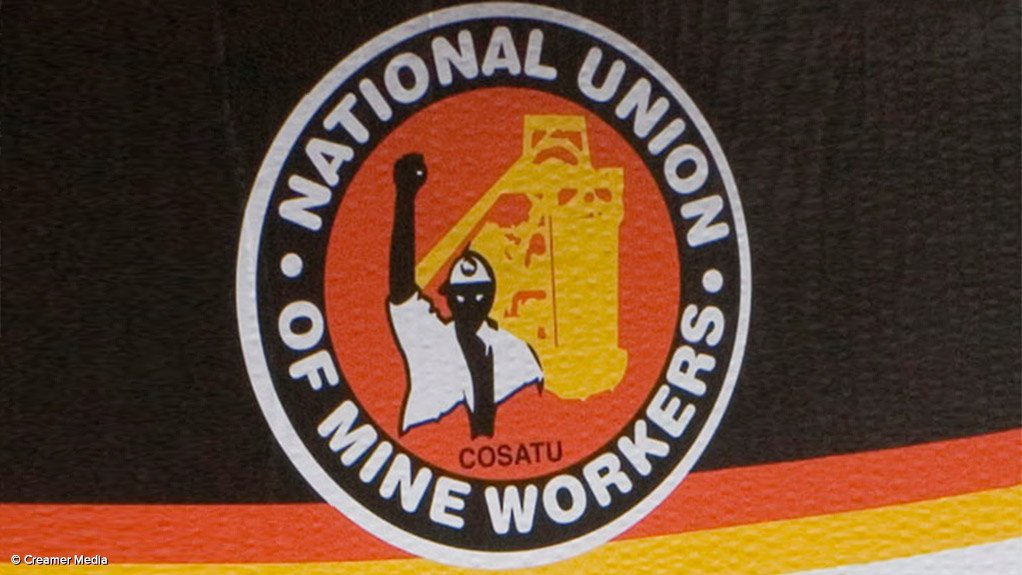JOHANNESBURG (miningweekly.com) – After reviewing the outcomes of the Farlam Commission of Inquiry into the events that led to the death of 34 miners at the hands of police near the Marikana mine, in Rustenburg, in 2012, the National Union of Mineworkers (NUM) has welcomed the commission’s recommendation for further investigations into the incident, maintaining that its members and officials had acted “within the parameters of private defence”.
The commission had been tasked with investigating the incidents at Marikana from August 11 to 16, 2012, which led to the deaths of 44 people, the injury of more than 70 persons and the arrest of 250 people following damage to and destruction of property.
Addressing the media the day after President Jacob Zuma’s release of the long-awaited commission’s outcomes report, NUM general secretary David Sipunzi said the “degree of criticism” directed at the NUM’s local branch leadership over its misguided advice to the striking rock-drill operators, as well as its attempts to encourage and assist nonstriking workers to return to work amid tense strike action, was “noted”.
The report, which had seemingly laid blame at the feet of most of those involved, also shouldered the NUM with some culpability for failing to ensure Lonmin engaged workers or exercise “effective control” in disputes between its members by ensuring that their conduct was lawful and nonviolent.
“The NUM will thoroughly consider these findings and will take immediate cognisance of them in the conduct of future affairs,” he told media at the union’s headquarters in Johannesburg.
The union had also agreed with the commissions findings that the South African Police Services' operational plan and its implementation fell short of what was required in mitigating the tensions during the escalating violence amid the strike action.
This emerged as Police Minister Nathi Nhleko promised that the next few months would be spent on implementing and executing the commission’s recommendations, absorbing the lessons learnt from the tragedy that would require institutional reform and transformation.
According to newswire African News Agency, Nhleko would be “summoned” to Parliament within the next two months to explain how he would implement the recommendations of the commission’s report.
“The commission called for [the] establishment of a panel of experts, which must look at exploring ways and means of alternative methods of policing in so far as crowd management and control is concerned.
“It called upon us to focus on issues of training and retraining of the service. It also called on us to have a closer relook at public order policing units,” he said, adding that the Ministry was currently studying the fuller version of the report.
The report had also laid blame on platinum miner Lonmin; national Police Commissioner Riah Phiyega; and North West provincial Police Commissioner Lieutenant-General Zukiswa Mbombo, as well as the Association of Mineworkers and Construction Union (AMCU) and individual strikers and "loose groupings".
Deputy President Cyril Ramaphosa – a former Lonmin nonexecutive director – and former Police Minister Nathi Mthethwa, were exonerated of culpability by the commission.
While the commission found that AMCU president Joseph Mathunjwa attempted to persuade the strikers to lay down their arms and leave the koppie, the trade union’s officials also failed to exercise effective control over members and supporters in ensuring that “their conduct was lawful and did not endanger the lives of others”.
The commission further reported that AMCU members sang “provocative songs and made inflammatory remarks”, aggravating an already tense environment.
Individuals and groups of strikers promoted conflict and confrontation, leading to the deaths – and endangering the lives of – Lonmin's security guards and nonstriking workers ahead of the police shootings.
However, the NUM on Friday criticised the commission’s failure to address compensation by the State for the dependants of the deceased – a purview that had fallen short of the commission’s terms of reference.
“The NUM remains of the view that some form of compensation should be paid … Such compensation should be paid by the employers [Lonmin] and the State, and should neither be limited to the deaths that occurred within the limited timeframe covered by the commission’s terms of reference nor to the dependants of the deceased who were employed by Lonmin,” Sipunzi said.
“Many lost their lives after August 16, and their deaths were accordingly not investigated by the commission,” he explained, further criticising the delay in prosecuting those responsible for the murders.
Meanwhile, trade union Solidarity said the commission’s report failed to point out that “the tragedy could have been prevented”.
“[While Solidarity] would still study the report in detail, it is clear at first glance that the report does not elaborate on the origin of the conflict situation,” Solidarity general secretary Gideon du Plessis said on Friday.
“The Marikana massacre is the direct result of the way in which law-breaking, be it serious or less serious, is dealt with in South Africa; that is, to ignore it until a crisis situation develops,” he added.
Du Plessis further said he hoped the report would correct the “misconception” that the shootings were the outcome of the wage disputes between Lonmin and its employees.
“It was more a case of a disorderly march emanating from frustrated members of the community. While there is compassion for, and empathy with, the challenging social conditions so many families in mining communities are enduring, we believe that, in the case of Marikana, the community exploited and exacerbated the labour dispute,” Du Plessis said.
EMAIL THIS ARTICLE SAVE THIS ARTICLE
To subscribe email subscriptions@creamermedia.co.za or click here
To advertise email advertising@creamermedia.co.za or click here











